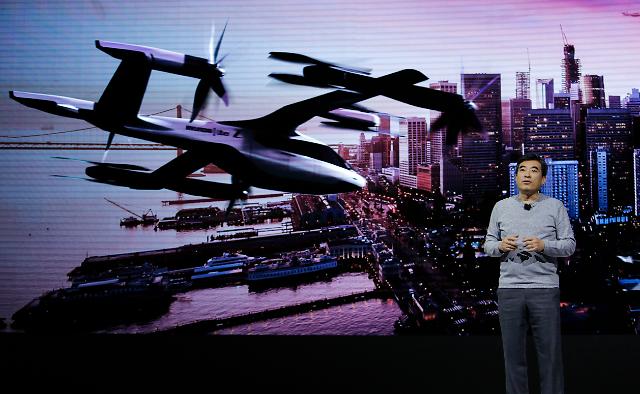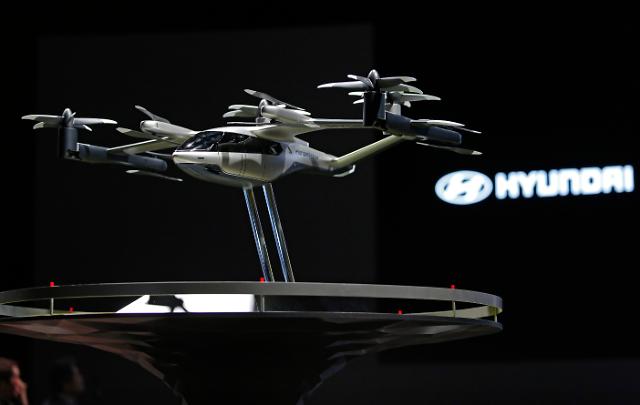
Hyundai's Urban Air Mobility head Shin Jai-won speaks about urban air taxi concept during a keynote speech at CES 2020. [AP / Yonhap]
Personal air vehicles (PAVs) and air taxis are emerging as a future system of travel on urban roads as the doorstep-to-doorstep average speed for cars is predicted to degrade further. Uber has said it's on track to start flying its first air taxis, with commercial service due to begin in 2023. The Uber concept shows its electric vertical-takeoff-and-landing craft, or eVTOL, transitioning from vertical to horizontal flight after a copter-like liftoff.
Hyundai is the first automaker to join Uber's Elevate initiative to commercialize air taxis. The air vehicle concept unveiled in Las Vegas was created in part through Uber's open design process, a NASA-inspired approach that jump-starts innovation by publicly releasing vehicle design concepts so any company can use them to innovate their air taxi models and engineering technologies.
"Our vision of Urban Air Mobility (UAM) will transform the concept of urban transportation," said Hyundai's UAM division head Shin Jai-won. "We are confident that Uber Elevate is the right partner to make this innovative product readily available to as many customers as possible."
Hyundai's air vehicle concept was designed to seat five people. It will be operated initially by a pilot before becoming autonomous. Hyundai will produce air vehicles, while Uber will provide airspace support services, connections to ground transportation, and customer interfaces through an aerial rideshare network. They will work together for infrastructure concepts to support take-off and landing.
"We believe Hyundai has the potential to build Uber Air vehicles at rates unseen in the current aerospace industry, producing high quality, reliable aircraft at high volumes to drive down passenger costs per trip. Combining Hyundai’s manufacturing muscle with Uber’s technology platform represents a giant leap forward for launching a vibrant air taxi network in the coming years," said Uber Elevate head Eric Allison.
Hyundai said S-A1 can fly at a speed up to 180 miles per hour require about five to seven minutes for recharging. It utilizes innovative design processes to optimize eVTOL aircraft and distributed electric propulsion that powers multiple rotors and propellers to increase safety. Small rotors reduce noise.
"Our goal is to help build dynamic human-centered future cities and continue our legacy of progress for humanity," said Executive Vice Chairman Chung Eui-sun, the auto group's de facto head. He has called for a drastic structural change to become a smart mobility solution company that combines mobility services with intelligent mobility products.
Along with the air vehicle concept, Hyundai presented its innovative vision for urban mobility to free future cities and people from constraints of time and space, based on mobility solutions including UAM, the ground-based purpose built vehicle (PBV) concept and a hub for mobility transfer and community activities.

A model of Hyundai's urban air taxi concept is being displayed at CES 2020 . [AP / Yonhap Photo]
For safety, Hyundai said its PAV has multiple rotors to provide multi-layer redundancy and ensure safe operation, and a parachute deployment system will be placed in the vehicle for emergencies. PAVs will be designed with low noise levels, making them more acceptable for urban travel and offering comfort to passengers.
Using light-weight from carbon composite materials, Hyundai will design the interior with Internet of Things (IoT) features while ensuring the comfort and safety of passengers.
Inspired by San Francisco’s iconic cable car, PBV is a ground-based eco-friendly mobility solution that provides customized spaces and services for passengers in transit. At CES 2020, two full-size PBV units are on display, one as a residential space and the other as a clinic. PBVs will allow passengers to enjoy tailored services and function as a restaurant, coffee shop, and hotel, or even a clinic and pharmacy.
Hyundai said PBVs would be highly customizable with the complete disassembly of upper- and under- bodies and adjustable sizes. Their interior can be personalized to individual needs by assembling modular parts. Artificial intelligence allows PBVs to navigate along the best routes and charge in-transit. PBSs can travel autonomously in platoon to bring innovative changes to personal deliveries and support the wider logistics industry.
The hub connects air-based UAMs and ground-based PBVs, the auto group said, adding it can be turned into a cultural complex by bringing together PBVs functioning as concert halls, movie theaters, and museums, or a medical complex by connecting medical service PBVs.



![[CES2024] Samsung-incubated startup showcases AI-based virtual closet](https://image.ajunews.com/content/image/2024/01/12/20240112103611328707.jpg)
![[CES2024] Global companies focus on AI-based services to help customers and employees](https://image.ajunews.com/content/image/2024/01/11/20240111135616705631.jpg)